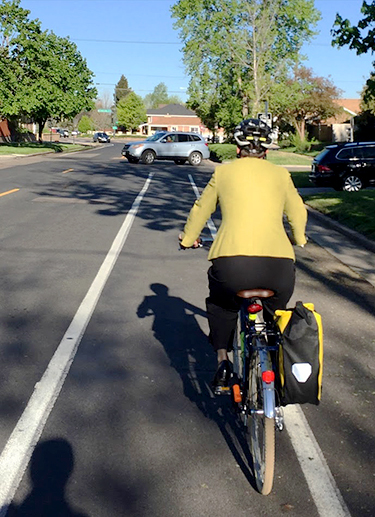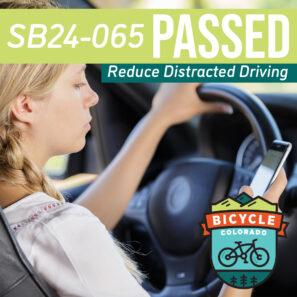The positive proof just keeps piling up
Quite a bit of research crosses our desks regarding the benefits of bicycling and the infrastructure that supports it. These studies show that encouraging cycling and providing safe ways to do it not only benefit those who pedal, but also the cities in which people ride and even those who do not ride. Not only are these study results positive, but the fact that these studies are being undertaken in the first place says a lot about the growing value being placed on bicycles.
Here are just a few of the ones we’ve been reading lately:
 Practical cycling is a practical way to stay healthy
Practical cycling is a practical way to stay healthy
We found this one in Momentum Magazine
The Oxford Journal of Public Health recently published a study that strongly supports the value of “utility” cycling – practical journeys by bike that aren’t just for pure sport. The study’s authors surveyed utility cyclists in the United Kingdom to see how likely they are to reach the UK’s physical activity guidelines, in addition to reviewing existing research on the topic.
The conclusions were strong and straightforward: utility cycling (riding for practical purposes, such as commuting) is one of the best ways to ensure people meet the minimum recommended 30 minutes per day / 150 minutes per week of exercise because it can integrate seamlessly into their lives. The study authors also found that utility cycling generally negates the external costs of motorized transport, including pollution and noise.
Essentially, riding for practical reasons is hugely valuable to your health. Cycling for fitness doesn’t need to mean putting on Spandex and pedaling for hours at a time over the mountains and through the woods. A two-mile daily commute to and from work goes a long way toward maintaining your health.
The study called out cycling as a “pragmatic policy option for public health decision-makers.” We couldn’t agree more, which is why we advocate strongly for bike lanes, bike routes, bike paths, Safe Routes to School and the integration of bicycle travel into transportation planning and funding at all levels.
NYC demonstrates that bikes lanes are a cheap way to improve public health
We found this one in FastCoExist
The Mailman School of Public Health at Columbia University took a closer look at the 45.5 miles of bike lanes New York City constructed in 2015 at a cost of $8 million. The study concluded that those lanes may increase the probability of riding bikes by 9.32 percent.
Don’t think that 9 percent a small or insignificant number. Our state’s own Economic and Health Benefits of Bicycling and Walking study, released last month as part of the Colorado Pedals Project, concluded that just a 10 percent increase in the number of people bicycling in Colorado—46,000 additional bicyclists—could result in approximately $51 million in additional health benefits to the state.
Because we don’t have (paid) access to the full study, we’ll let the FastCoExist story take it from here:
“Per dollar spent, constructing bike lanes is a cheap way to improve public health. For instance, back in 2005, New York City spent $10 million on curbing traffic as part of the federally-funded Safe Routes to School program. Sidewalks were widened, bike lanes constructed, and traffic lights re-phased to suit pedestrians. The ‘net societal benefit’ of these changes? The study’s authors estimate it to be $230 million. ‘We conclude that investments in bicycle lanes come with an exceptionally good value because they simultaneously address multiple public health problems,’ says the study. ‘Investments in bike lanes are more cost-effective than the majority of preventive approaches used today.'” (Emphasis ours.)
Cycling matters for “Smart Cities”
This last one comes to us from the Journal of Transport Geography (yep, it’s a thing) and is a little more wonky, but bear with us. The study followed a group of wirelessly networked e-city bikes in the UK and demonstrated that they can fit into the current trends of “smart cities” and the “Internet of things.” Those two concepts are popular in modern transportation and city planning circles (think driverless cars and other wirelessly connected, data-driven modes of transport) but they generally exclude bikes in thinking, discussions and research.
The goal of the study was primarily to show that bicycles need to be integrated in all of the technology talk currently gaining prominence in transportation planning. Smart cities should not – and in our opinion can not – rise to the fore without the inclusion of bicycling infrastructure. To that end, we’re hosting a conference in February to help address this. We are well aware that within the next 20 years, transportation in Colorado will completely change as we know it. Our new, one-day conference called Moving People Forward will dive deep into the present and future face of mobility and the creative and collaborative advancements that are changing the ways people move.
Check out Moving People Forward and register before the end of the year for a discounted rate!
Leave A COMMENT
Our twitter feed is unavailable right now.
The Latest News
view all- Jul 1, 2025
- by Bicycle Colorado
In Their Words: Siblings Log Thousands of Miles by Biking to School
Guest Blog Post: By The Williams Family It sounds like a scene from a bygone era: a brother and sister set off on bicycles to school each and every morning, sometimes stopping at the public library or the ice cream parlor on the way home after school. For Denver residents Luella and…
- Bicycle Commuting,
- Kids on Bikes,
- Safe Routes,
- Transportation Talk
- No Comments








